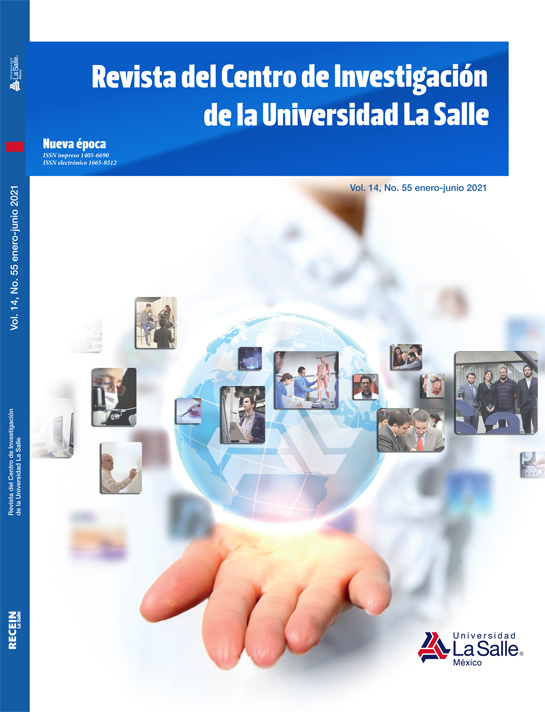Impacto de la pandemia Covid-19 sobre profesores y estudiantes en escuelas de negocios en México5542
Contenido principal del artículo
Resumen
El objetivo de este estudio es el entendimiento del impacto que tiene la pandemia de Covid-19 en la salud mental de estudiantes y profesores de escuelas de negocios en México, mediante la evaluación de las variables: depresión, ansiedad, insomnio, impacto del evento Covid-19 y agotamiento.
Para este propósito, se realizó un estudio longitudinal con 834 participantes (161 profesores y 673 estudiantes), se calcularon las correlaciones entre las variables de estudio, un análisis de frecuencias y posteriormente un análisis de varianza teniendo como variable independiente a la presencia o no de la pandemia -inicio y final del curso-, como variable moderadora, el tipo de participante -estudiante o profesor- y la variable dependiente, la variable relacionada con la salud mental en cuestión.
Las conclusiones indican que hay un impacto en la salud mental de los participantes derivado de la pandemia de Covid-19 y que éste es diferente estudiantes y profesores, siendo estos últimos los más afectados en su salud mental por los efectos de la pandemia Covid-19.
Descargas
Detalles del artículo
El autor puede disponer de su artículo para su archivo en repositorios institucionales o en páginas web personales, con la referencia y agradecimientos a la fuente donde se ha publicado.
Citas
Baader, T., Molina, J.L., Venezian, S., Rojas, C., Farías, R., Fierro-Freixenet, C., Backenstrass, M., y Mundit, C. (2012). Validación de la encuesta PHQ-9 en el diagnóstico de depresión en pacientes usuarios de atención primaria en Chile. Revista Chilena de Neuro Psiquiatría, 50(1), 10-22.
Bastien, C, Valliéres, A., y Morin, C. (2001). Validación del índice de gravedad del insomnio como medida de resultado para investigación del insomnio. Sleep Medicine. 2(4), 297-307.
CDC (2020). Enfermedad del coronavirus 2019 (Covid-19). https://espanol.cdc.gov/coronavirus/2019-ncov/daily-life-coping/managing-stress-anxiety.html.
Colín, C. G. (2019). El rol mediador del capital psicológico entre la adicción al trabajo y el burnout en trabajadores mexicanos. The Anáhuac Journal, 19(2), 71-96.
https://doi.org/10.36105/theanahuacjour.2019v19n2.
Cullen, W., Gulati, G., & Kelly, B.D. (2020). Mental health in the Covid-19 pandemic. QJM an International Journal of Medicine. 113(5), 311-312. https://doi.org/10.1093/qjmed/hcaa110
Da Silva, A.G., Miranda, D.M., Diaz, A.P, Teles, A.L.S, Malloy-Diniz, L.F., & Palha A.P. (2020). Mental health: why it still matters in the midst of a pandemic. Brazilian Journal of Psychiatry. 42(3). 229-231. https://doi.org/1590/1516-4446-2020-0009
Duan, L., & Zhu, G. (2020). Psychological interventions for people affectation by the Covid-19 epidemic. The Lancet, 7(4), 300-302. https://doi.org/10.1016/52215-0366(20)30073-0
ENCOVID19 (2020). Encuesta de seguimiento de los efectos del Covid en el bienestar de los hogares mexicanos. Universidad Iberoamericana. https://ibero.mx/sites/default/files/comunicadoencovid-19completo.pdf
García, L. (2021). Covid-19 y educación a distancia digital: preconfinamiento, confinamiento y posconfinamiento. RIED. Revista Iberoamericana de Educación a Distancia, 24(1), 9-32. https://doi.org/10.5944/ried.24.1.28080
Ho, C. S., Cheen, C. Y., & Ho, A.C. (2020). Mental health strategies to combat the psychological impact of Covid-19 beyond paranoia and panic. Annals of the Academy of Medicine of Singapore, 49(3), 155-160.
Hodges, C., Moore, S., Lockee, B., Trust, T., & Bond, A. (2020). The difference between remote teaching and online learning. Educase Review. https://er.educase.edu/articles(2020/3/the-difference-betweenemergency-remote-teaching-and-onlinelearning
Hu, L. S., & Bentler, P. M. (1999). Cuttoff criteria for fit indexes in covariance structure analysis: Conventional criteria versus new alternatives. Structural Equation Modeling; A Multidisciplinary Journal, 6, 1-55. https://doi.org/101080/107055199095400118
IESALC-UNESCO (2020). El coronavirus-19 y la educación superior: impacto y recomendaciones. https://cutt.ly/xdHJuhK
Jakovljevic, M., Bjedov, S. Jaksic, N., & Jakovljevic, I. (2020). Covid-19 pandemia and public and global mental health form the perspective of global health security. Psychiatria Danubina, 32(1), 6-4. https://doi.org/10.24869/psyd.2020.6
Levy, S. (2020). Covid-19 Serie de documento de política pública: sugerencias para la emergencia. PNUD LAC C19 PDS, 2,
Li, J., Ma. S., Wang., Y., Cai, Z., Hu, J., Wei, N., Du, H., Chen, T., Li, R., Tan, H., Kang, L., Yan., L., Huang, M., Wang, H., Wang, G., Liu, Z., & Shauhua, H. (2020a). Factors associated with mental health outcomes among health care workers exposed to Coronavirus disease 2019. JAM Network Open, 3(3): e203976. https://doi.org/10.1001/jamanetworkopen.2020.3976
Li, W., Yang, Y, Liu, Z., Zhao, Y., Zhang, Q., Zhang, L., Cheung, T., & Xiang, Y. (2020b). Progression on mental Health Services during the COVID-19 Outbreak in China. International Journal of Biological Sciences, 16(10), 1732-1738. https://doi.org/10.7150/ijbs.45120
Maslach, C., & Jackson, S. E. (1981). The measurement of experienced burnout. Journal of Organizational Behavior, 2(2), 99-113.
Means, B., Bakia, M., y Murphy, R. (2014). Aprender en línea: lo que la investigación nos dice sobre sí, cuándo y cómo. Routledge.
OMS (2020). Covid-19: Cronología de la actuación de la OMS. https://www.who.int/es/news-room/detail/27-04-2020-who-timeline---covid.19
OMS (2005). Alerta epidémica y respuesta. Plan mundial de las OMS de preparación para una pandemia de influenza: función y recomendaciones de la OMS para las medidas nacionales antes y durante la pandemia. https://www.paho.org/spanish/ad/dpc/cd/vir-flu-plan-mundial-oms.htm
Page, L.A., Seetharaman, S., Suhail, I., Wesseley, S., Pereira, J., & Rubin, J.G. (2011). Using electronic patient records to assess the impact of swine flue (Influenza H1N1) on mental health patients. Journal of Mental Health, 20(1), 60-69.
Pérez, C. (2004). Técnicas de análisis multivariado de datos. Pearson-Prentice Hall.
Podsakoff, P., Mackenzie, S., Lee, J., & Podsakoff, N. (2003). Common method biases in behavioral research: a critical review of the literature and recommended remedies. Journal of Applied Psychology, 88(5), 879-903. https://doi.org/10.1037/0021-9010.88.5.879
Ricci-Cabello, I., Meneses-Echavez. J.F., Serrano-Ripoll, M.J., Fraile-Navarro, D., Fiol de Roque, M.A., Pastor, G., Castro, A., Ruiz-Perez, I., Zamanillo, R., y Goncalves-Bradley, D. (2020). Impact of viral epidemic outbreaks on mental health of healthcare workers: A rapid systemic review. medRxiv, preprint. https://doi.org/10.1101/2020.04.02.20048892
Secretaría de Salud (2020). Todo sobre el Covid-19. Recuperado de https://coronvirus.gob.mx
Spitzer, R.L., Kroenke, K., Williams, J.B.W., Löwe, B. (2006). A Brief Measure for Assessing Generalizad Anxiety Disorder: The GAD-7. Archives of Internal Medicine, 166(10), 1092-1097
Taylor, S. (2019). The Psychology of Pandemics: Preparing for the next Global Outbreak of Infectious Disease. Newcastle upon Tyne, Cambridge Scholars Publishing.
UNESCO (2020). Startling digital divides in distance learning emerge. Recuperado de https://cutt.ly/adH2SRS
Wang, C., Pan, R., Wang, X., Tan, Y., Xu, L. y Ho, C.S. (2020). Immediate psychological responses and associated factors during the initial stage of the 2019 coronavirus disease (COVID-19) epidemic among the general population in China. International Journal of Environment Research on Public Health, 17, 17-29
Weiss, D. & Marmar, C. (1997). The impact of event scale-revised. En J. Wilson & M. Keane (Eds)., Assessing Psychological Trauma and PTSD. Guilford Press.
 English
English


